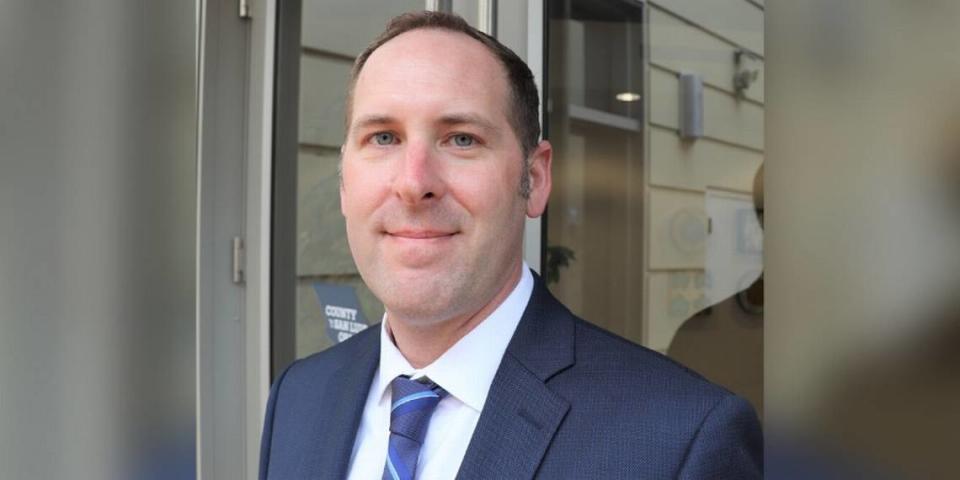SLO County congressman’s bill aims to get more veterans into housing. Here’s how
- Oops!Something went wrong.Please try again later.
After a year in which homelessness among veterans in San Luis Obispo County fell to some of the lowest levels in the past five years, Rep. Salud Carbajal is gearing up to reintroduce a bill to further aid unhoused veterans.
At a Thursday virtual press conference, the Central Coast congressman reintroduced the Home for the Brave Act, a bill aimed at helping connect the country’s most vulnerable veterans to aid programs by lowering some barriers to entry.
Originally introduced in 2017 and co-sponsored by Rep. Lloyd Smucker, R-Pennsylvania, the Home for the Brave Act was introduced in the 2019 and 2021 legislative sessions but failed to pass into law.
Carbajal said he believes every time the bill has been introduced, it has come closer to passing, and he said the most recent iteration of the bill enjoys bipartisan support.
Carbajal was joined by representatives of the Community Action Partnership of San Luis Obispo County and San Luis Obispo County veteran service officer Morgan Boyd, who added their support for the bill and explained how it could help the county’s veteran population.
“It has been said that trying to change government policy at the federal level is like trying to turn an aircraft carrier,” Carbajal said. “These folks here are the precision advocates that can move more like fighter jets, being nimble and getting results for our veterans.”
What is the Home for the Brave Act?
Carbajal said the Home for the Brave Act would expand the number of services veterans can access by exempting Veteran Affairs disability benefits from counting toward the veteran’s total income when determining their eligibility for supportive programs.
According to a representative from Carbajal’s office, 2022 data from the Department of Veterans Affairs showed the average veteran on disability receives $20,686 a year.
Under the Home from the Brave Act, that figure would be removed from the calculation of the veteran’s income for Housing and Urban Development support programs, which use the county’s area median income to determine whether a client makes too much or too little to qualify for aid.
In San Luis Obispo County, the area median income is roughly $82,000.
“The issue is this: Veterans right now looking to get housing assistance from (HUD) we will see disability benefits they may have earned with their service (be) treated as income,” Carbajal said during the press conference. “I think people can understand how absurd that is. This is not money that you can dip into to afford a down payment, or to pay rent or mortgage.”
Local housing, veteran support organizations show support
In her statement on the bill, CAPSLO CEO Elizabeth “Biz” Steinberg touted the bill’s endorsements, which include the Veterans of Foreign Wars, the American Legion, the Military Officers Association of America, and, she joked, her 106-year-old uncle, who she said is the oldest living Merchant Marine who served in World War II.
Steinberg said the bill could expand the number of services a veteran can be eligible for, including the county’s Housing and Urban Development-Veterans Affairs Supportive Housing program, commonly referred to as HUD-VASH.
The HUD-VASH program — administered in San Luis Obispo County by CAPSLO — provides housing vouchers and intensive case management to homeless veterans, while circumventing the long wait times that typically come with housing vouchers.
Brandy Graham, a program manager at CAPSLO’s Supportive Services for Veteran Families office in Paso Robles, said while the Home for the Brave Act likely won’t dramatically increase the number of clients that programs such as HUD-VASH can serve, it will improve the depth of service a client can receive.
“The coordination and accessibility of long-term benefits — both subsidy and case management — is the biggest challenge for us locally,” Graham said during the press conference. “Our disabled veterans will benefit from long-term case management available through programs like HUD-VASH, which currently, generally they are ineligible for, if they are in those higher echelons of service connection.”
CAPSLO’s support office specializes in short-term interventions for veterans and their families that are experiencing homelessness or at risk of becoming homeless, Graham said.
In the 2023 program year, which ended Sept. 30, the office served 119 veterans or veteran families, placing 53 veteran households into permanent housing and preventing seven households from falling into homelessness, Graham said.
Boyd, SLO County’s veteran services officer, said lowering the barrier to service could help veterans with “presumptive conditions” gain access to extended benefits late into life. Those conditions refer to health problems caused by military service that manifest as veterans age, such as exposure to Agent Orange or breathing fumes from burn pits.
As veterans age, their ability to work declines, particularly if the veteran has a disability, lowering their income enough to cause financial and housing stress, Boyd said. But with VA disability benefits counting as part of their income, they often make too much to qualify for extended benefits, he said.
What’s next for the Home for the Brave Act?
Carbajal said he has high hopes for the bill once Congress is no longer focusing its attention on how to avert a government shutdown.
Next steps involve building a coalition of votes to pass the bill, he said.
“It’s pretty much a common-sense bill,” Carbajal said. “If you really want to help our veterans, and if you care about their well-being, I don’t see why we wouldn’t get the support we need.”




